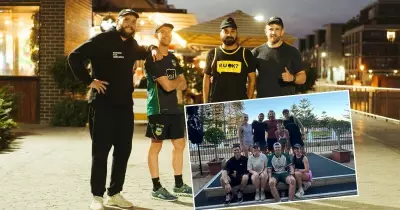
As the festive season's cheer begins to fill the air, a crucial national initiative is calling on Australians to look beyond their own celebrations and consider those for whom this time of year brings profound isolation. Social Inclusion Week, which commenced on Saturday, serves as a powerful reminder of our fundamental need for connection and community.
The Heavy Burden of the Festive Season
Established by Jonathon Welch AM, the visionary founder of the Choir of Hard Knocks, this week is dedicated to ensuring every Australian has the chance to participate fully in society. Its timing, leading directly into the holiday period, is critically important.
For a significant number of people, the festive period is not a source of joy but a heavy emotional burden. The relentless, highly publicised expectation of happiness exerts crushing pressure on those already grappling with emotional fragility, long-term unhappiness, or grief. The holidays dramatically amplify feelings of loneliness.
We are constantly bombarded with media images of perfect families, overflowing dinner tables, and raucous parties. This creates a cruel dichotomy where socially isolated individuals often feel their loneliness is not just a personal affliction, but a failure to meet a societal standard. While the world appears to be celebrating, the excluded feel their isolation is intensified, louder, and more painful than at any other time.
Turning Awareness into Concrete Action
This is a period when people in vulnerable situations—whether due to age, disability, poverty, bereavement, or simply being new to a community—face an even greater risk. Loneliness is not merely sadness; it is a serious health issue linked to higher rates of depression, anxiety, and physical illness.
The solution, in principle, is simple, yet it requires deliberate and concrete action. We must shift the idea of social inclusion from a passive concept to an active practice. It is not enough to vaguely acknowledge that we 'should catch up' with people who are struggling, nor is it sufficient to believe that someone else will step in.
This year, as we prepare our homes and schedules, we are challenged to look beyond our immediate circle. We must identify that one person who might otherwise face a festive season defined by silence and emptiness. Think of the new colleague whose family is interstate, the elderly neighbour who hasn't driven in years, or the international student spending their first summer far from home.
The Power of a Specific Invitation
An invitation is a powerful act, but it must be specific. It should not be a vague promise, but a clear offer with a date, time, and location to which they can commit.
- It could be an invitation to a low-key Christmas Eve dinner, not just the chaotic main event on the day.
- It could be a specific offer to drive them to the shops to help with gift shopping or wrapping.
- It could be including them in a simple midweek barbecue as an easy way to socialise before the main holidays begin.
By extending a precise, time-bound offer, we validate that person's worth and provide a tangible point of connection. This simple act acknowledges their presence in the community and builds a crucial barrier against the holiday-induced surge of isolation.
The spirit of Social Inclusion Week is a challenge to every one of us. Let us commit to turning the abstract concept of welcome into a solid, usable action. Look for the empty chair, and extend the invitation that fills it. This is the smallest effort we can make for the biggest possible difference to someone's emotional wellbeing this holiday season. And in doing so, we often find it enriches our own lives as well.





